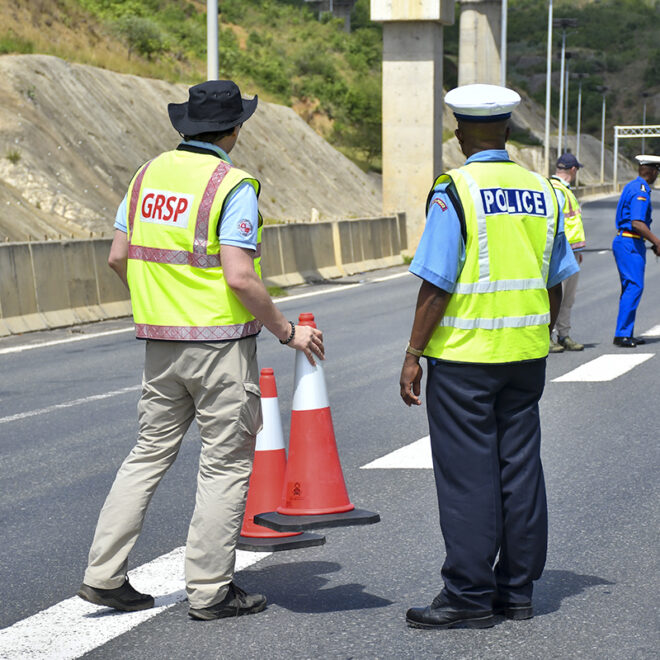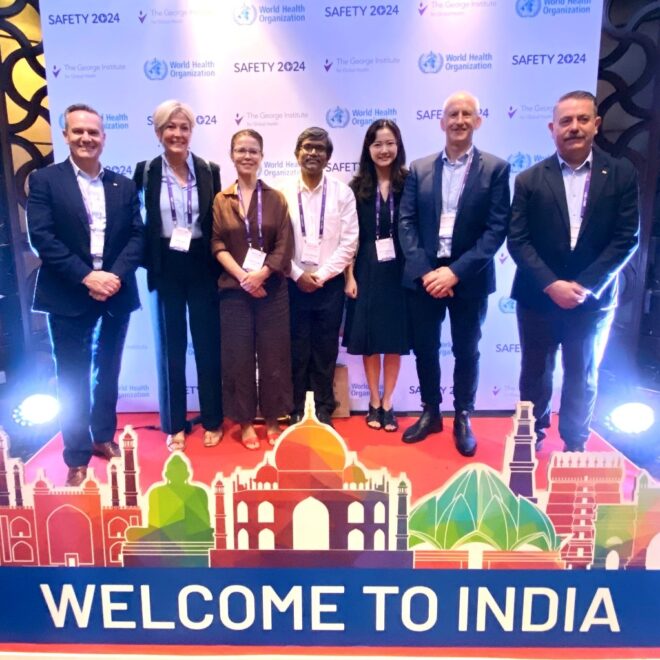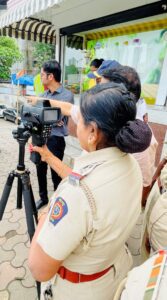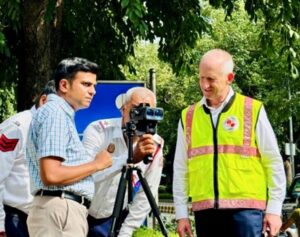

Across the globe, police play a crucial role as key advocates for speed limits that align with the principles of the ‘safe system’. These principles aim to protect lives and prevent serious injuries on the roads.
We know what constitutes ‘survivable’ speed limits, understand the necessity of stringent speed enforcement, and are well aware of the consequences when collisions occur.
Police officers witness the effects of pre-collision and impact speeds daily, and the evidence is unequivocal: speed not only influences the likelihood of a crash but also determines the severity of injuries when crashes do happen.
Attending crash scenes means police often see the devastating aftermath firsthand, from the tragic injuries to the heart-wrenching task of informing families. They also recognise the long-term support many crash victims need, including assistance through legal and coronial processes.
Police have the opportunity to stand alongside other experts and advocate for speed limits that are backed by solid evidence. They can serve as respected community leaders and help to raise awareness about the real dangers of excessive speed, as well as promote the strategies proven to reduce road trauma.
Too often, we hear misguided arguments about the impact of unsafe speed limits, with no one holding uninformed commentators accountable for spreading misinformation. The Global Plan – Decade of Action for Road Safety 2021-2030 sets out clear recommendations for speed limits, including:
The evidence is overwhelming: when average speeds are reduced, road trauma is significantly decreased.
Professor Ian Johnston, former Director of the Monash University Accident Research Centre (MUARC), has highlighted the vast body of research supporting this ‘rule of thumb’. A reduction of just 5% in average speed can result in approximately a 10% decrease in all injury crashes and a 20% reduction in fatal crashes.
This formula has withstood the rigorous scrutiny of peer review and continues to prove its value.
We urge police forces worldwide to be vocal advocates for governments to adopt evidence-based speed limits, enforce them rigorously, and help mitigate the devastating effects that excessive speed has on communities.
For more information on the impact of speed on crash risk and severity, please visit the Global Road Policing Network (GRPN) – Global Road Safety Partnership grsproadsafety.org.
In June, the Global Road Safety Partnership (GRSP) as part of the Bloomberg Philanthropies Initiative for Global Road Safety (BIGRS) and the Mombasa Police jointly organized the first hands-on training on speed enforcement. It took place in Mombasa, Kenya, following theoretical training which had previously taken place.
The GRSP had identified police officers as participants for a ‘Train the Trainer’ programme on speed enforcement which aimed to expand the participants’ knowledge. The topics covered included the dangers of speeding, the need for speed enforcement, preparation of checkpoints and basic safety rules.

In June, the Global Road Safety Partnership (GRSP) as part of the Bloomberg Philanthropies Initiative for Global Road Safety (BIGRS) and the Mombasa Police jointly organized the first hands-on training on speed enforcement. It took place in Mombasa, Kenya, following theoretical training which had previously taken place.
The GRSP had identified police officers as participants for a ‘Train the Trainer’ programme on speed enforcement which aimed to expand the participants’ knowledge. The topics covered included the dangers of speeding, the need for speed enforcement, preparation of checkpoints and basic safety rules. They were also tutored to enhance their skills in conducting training for other traffic police officers. The training involved trainers from the Coast Regional Training Centre.
This two-day training combined the GRSP team’s knowledge with the local trainers’ knowledge of the BINAR radar which encompasses the basic principles of setting up checkpoints, safety rules and speed measurement.

The participants had the opportunity to present technical aspects of the BINAR radar and its functions, setting parameters, maintaining devices and taking measurements. Hands-on training using the device took place on a local road.

Other hands-on training in the field (on selected black spots) covered clarification of safety issues. GRSP also imparted knowledge on setting up ‘spot and stop checkpoints’ which allowed the participants to check vehicles and perform control activities on the road.

Other practical field training took place at selected black spots and included clarification of safety issues. GRSP also imparted knowledge on setting up ‘spot and stop’ checkpoints which allowed the participants to check vehicle speeds and safely perform vehicles stops to allow enforcement action to be taken against speeding drivers.
The training involved representatives from the Mombasa County Inspectorate and National Transport Safety Authority inspectors. While the Mombasa County Inspectorate inspectors are not authorized to conduct speed checks, this activity presented them with an opportunity to build their understanding of the importance of enforcement and cooperation with the police.
Additionally, the speed enforcement activities received significant media attention. Generating public awareness of the speed enforcement programme is an important part of role of police. Police activities in Mombasa provide an example of a shift in the police approach aimed at improving road safety.


In September 2024, members of the Global Road Safety Partnership’s (GRSP) Road Policing Capacity Building Team (RPCB) attended the 15th World Conference on Injury Prevention and Safety Promotion, known as Safety 2024, in New Delhi, India. The event, which took place from 2 to 4 September, focused on promoting equitable and sustainable strategies for injury and violence prevention, drawing attention from experts and stakeholders worldwide.
The conference, organised by The George Institute for Global Health in collaboration with the World Health Organization (WHO) and other key organisations, underscored the urgent need to address injuries and violence, which disproportionately affect low- and middle-income countries. Over 90% of the global burden of injuries is borne by these countries, and within them, the most socio-economically disadvantaged populations are at greatest risk.
Recognising the critical role of policing in injury prevention, the RPCB team conducted a series of capacity-building workshops before and after the conference. These workshops, part of GRSP’s ongoing work with the Bloomberg Philanthropies Initiative for Global Road Safety, were delivered to police and transport authorities in Bengaluru, New Delhi, and Mumbai.

Image: GRSP Team members attending Safety 2024
In September 2024, members of the Global Road Safety Partnership’s (GRSP) Road Policing Capacity Building Team (RPCB) attended the 15th World Conference on Injury Prevention and Safety Promotion, known as Safety 2024, in New Delhi, India. The event, which took place from 2 to 4 September, focused on promoting equitable and sustainable strategies for injury and violence prevention, drawing attention from experts and stakeholders worldwide.
The conference, organised by The George Institute for Global Health in collaboration with the World Health Organization (WHO) and other key organisations, underscored the urgent need to address injuries and violence, which disproportionately affect low- and middle-income countries. Over 90% of the global burden of injuries is borne by these countries, and within them, the most socio-economically disadvantaged populations are at greatest risk.
The Delhi Declaration and Global Commitment
The RPCB team supported the Delhi Declaration, a call to action presented at the conference’s conclusion. The Declaration reaffirms the international commitment to reducing injuries and violence, with a focus on equity, accountability, and environmental sustainability. These principles are critical in creating safer communities, particularly in low-resource settings where road traffic deaths and injuries have become a major public health challenge.
Road policing plays a pivotal role in road safety, as police can directly influence driver behaviour by deterring behaviours that cause road trauma. Road crashes and traffic-related violence are preventable, yet they continue to claim lives, especially in countries with under-resourced enforcement systems.
Road Policing Capacity Building: Workshops in India
Recognising the critical role of policing in injury prevention, the RPCB team conducted a series of capacity-building workshops before and after the conference. These workshops, part of GRSP’s ongoing work with the Bloomberg Philanthropies Initiative for Global Road Safety, were delivered to police and transport authorities in Bengaluru, New Delhi, and Mumbai.
Enforcement Leadership Workshops: Senior leaders from the Karnataka Transport Department participated in this training, which focused on developing strategic leadership skills in road policing. Strong leadership within police agencies is essential for sustaining road safety efforts and implementing evidence-based policies.

Image: Mumbai Traffic Police participants engage in a tabletop exercise during Crash Investigation training.

Image: Mumbai traffic Police Speed Enforcement practical exercise

Image: Delhi Traffic Speed Enforcement Practical Exercise.
Impact and Future Directions
In total, the workshops engaged 190 participants across the three cities, enhancing their capacity to tackle road safety issues and enforce traffic laws more effectively. These workshops represent a key element of GRSP’s broader strategy to reduce road fatalities and injuries by strengthening the role of police agencies worldwide.
The RPCB team’s participation in Safety 2024 and their work in India are part of a global effort to address road safety challenges, especially in countries where the burden of road traffic injuries is highest. Through targeted training, the RPCB aims to empower police officers to lead change in their communities, contributing to the global goal of reducing road traffic deaths by 50% by 2030, as set out in the UN Decade of Action for Road Safety.
For more information on the Global Road Safety Partnership’s initiatives and resources, please visit Global Road Safety Partnership.
In memory of Dr Ray Shuey AM, APM, PhD
1945 – 2024
It is with profound sadness that we announce the passing of Dr Ray Shuey, a highly respected former Assistant Commissioner of Victoria Police, Australia, and a long-serving consultant to the Global Road Safety Partnership (GRSP). Ray passed away in 2024, leaving behind a remarkable legacy of service, dedication, and leadership in road safety, both in Australia and internationally.
Throughout his distinguished career, Ray made significant contributions to road policing and safety, spearheading capacity-building initiatives across the Asia-Pacific region and beyond. His work on the development of road policing manuals and his efforts to strengthen enforcement systems have had a lasting impact, saving countless lives and making roads safer for all.
Ray’s tireless commitment to improving road safety was recognised in 2020 when he was named Senior Australian of the Year, a fitting tribute to his lifetime of work. His influence extended far beyond Australia, as he became a respected figure in global road safety, sharing his expertise and passion wherever it was needed.
At GRSP, Ray was more than just a consultant—he was a cherished colleague and friend. His wisdom, generosity, and unwavering dedication to public safety will be deeply missed by all who had the privilege of working alongside him.
Our thoughts and heartfelt condolences are with Ray’s family during this difficult time. His legacy will continue to inspire us all as we carry forward his mission of making the world’s roads safer for everyone.
